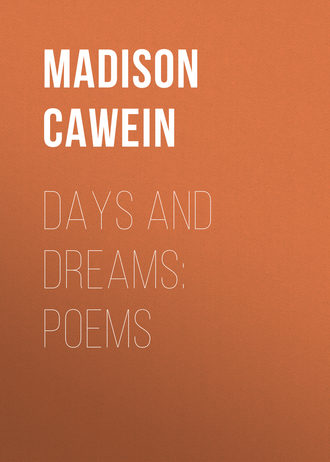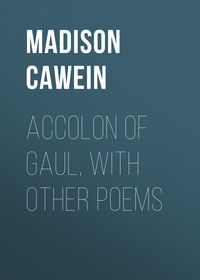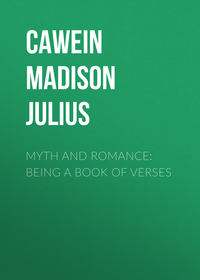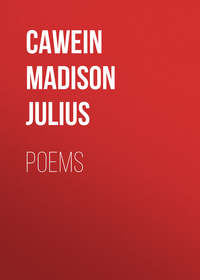Days and Dreams: Poems
 полная версия
полная версияDays and Dreams: Poems
Язык: Английский
Год издания: 2017
Добавлена:
Настройки чтения
Размер шрифта
Высота строк
Поля
MATER DOLOROSA
The nuns sing, "ora pro nobis,"The lancets glitter above;And the beautiful Virgin whose robe isWoven of infinite love,Infinite love and sorrow,Prays for them there on high; —Who has most need of her prayers, – to-morrowShall tell them, – they or I?Up in the hills togetherWe loved, where the world seemed true;Our world of the whin and heather,Our skies of a nearer blue,A blue from which one borrowsA faith that helps one die —O Mother, sweet Mother of Sorrows,None needs such more than I!We lived, we loved unwedded —Love's sin and its shame that slays! —No ill of the year we dreaded,No day of its coming days;Its coming days, their manyTrials by morn and night,And I know no land, not any,Where love's lilies grow so white!Was he false to me, my Mother!Or I to him, my God! —Who gave thee right, O brother!To take God's right and rod!God's rod of avenging morrows,And the life here in my side!O Mother, God's Mother of Sorrows,For both I would have died!By the wall of the Chantry kneeling,I pray and the organ rings,"Gloria! gloria!" pealing,"Sancta Maria" sings!They will find us dead to-morrowBy the wall of their nunnery,O Mother, sweet Mother of Sorrow!His unborn babe and me.THE OLD INN
1Red-winding from the sleepy town,One takes the lone, forgotten laneStraight through the hills. A brush-bird brownBubbles in thorn-flowers sweet with rain;Light shivers sink the gleaming grain;The cautious drip of higher leavesThe lower dips that drip again. —Above the tangled tops it heavesIts gables and its haunted eaves.2One creeper, gnarled to bloomlessness,O'er-forests all its eastern wall;The sighing cedars rake and pressDark boughs along the panes they sprawl;While, where the sun beats, breaks a drawlOf hiving wasps; one bushy bee,Gold-dusty, hurls along the hallTo hum into a crack. – To meThe shadows seem too scared to flee.3Of ragged chimneys martins makeHuge pipes of music; twittering hereBuild, breed, and roost. – My footfalls wakeStrange stealing echoes, till I fearI'll meet my pale self coming near;My phantom face as in a glass;Or one men murdered, buried – where?Dim in gray, stealthy glimmer, passWith lips that seem to moan "Alas."LAST DAYS
Aye! heartbreak of the tattered hills,And mourning of the raining sky!Heartbreak and mourning, since God wills,Are mine, and God knows why!The brutal wind that herds the stormIn hail-big clouds that freeze along,As this gray heart are doubly warmWith thrice the joy of song.I held one dearer than each dayOf life God sets in limpid gold —What thief hath stole that gem awayTo leave me poor and old!The heartbreak of the hills be mine,Of trampled twig and mired leaf,Of rain that sobs through thorn and pineAn unavailing grief!The sorrow of the childless skies'Good-nights, long said, yet never said,As when I kissed my child's blue eyesAnd lips ice-dumb and dead.THE ROMANZA
In a kingdom of mist and moonlight,Or ever the world was known,Past leagues of unsailed water,There reigned a king with a daughterThat shone like a starry stone.The day grew out o' the moonlight;But never a day was there.The king was wise as hoary,And his daughter, like the gloryOf seven kingdoms, fair.And the night dimmed over the moonlight, —And ever the mist was gray, —With slips of dull stars, bluerWhere the princess met her wooer,A page like the month o' May.In her eyes the mist, and the moonlightIn hair of a crumpled gold;By day they wooed a-hawking,A-hawking laughed, a-mockingThe good, white king and old.On the sea the mist, and the moonlightPoured pale to the lilies' tips; —At eve, when the hawks were feeding,In courts to the kennels leading,He kissed her mouth and lips.On towers the mist, and the moonlightOn a dead face staring up; —His kingly couch was ready,But and her hand was steadyGiving the poisoned cup.MY ROMANCE
If it so befalls that the midnight hoversIn mist no moonlight breaks,The leagues of years my spirit covers,And myself myself forsakes.And I live in a land of stars and flowers,White cliffs by a silver sea;And the pearly points of her opal towersFrom the mountains beckon me.And I think that I know that I hear her callingFrom a casement bathed with light —The music of waters in waters fallingTo palms from a rocky height.And I feel that I think my love's awaitedBy the romance of her charms;That her feet are early and mine belatedIn a world that chains my arms.But I break my chains and the rest is easy —In the shadow of the roseSnow-white, that blooms in her garden breezy,We meet and no one knows.To dream sweet dreams and kiss sweet kisses;The world – it may live or die;The world that forgets, the soul that missesThe life that has long gone by.We speak old vows that have long been spoken,And weep a long-gone woe, —For you must know our hearts were brokenHundreds of years ago.THE EPIC
"To arms!" the battle bugles blew.The daughter of their Earl was she,Lord of a thousand swords and true;He but a squire of low degree.The horns of war blew up to horse:He kissed her mouth; her face was white;"God grant they bear thee back no corse!" —"God give I win my spurs to-night!"Each watch-tower's blazing beacon scarredA blood-blot in the wounded dark:She heard knights gallop battleward,And from the turret leaned to mark."My God, deliver me and mine!My child! my God!" all night she prayed:She saw the battle beacons shine;She saw the battle beacons fade.They brought him on a bier of spears. —For him – the death-won spurs and name;For her – the sting of secret tears,And convent walls to hide her shame.THE BLIND HARPER
And thus it came my feet were ledTo wizard walls that hairy hungOld as their rock the moss made dead;And, like a ditch of fire flungAround it, uncouth flowers redThrust spur and fang and tongue.And here I harped. Did dead men list?Or was it hollow hinges gnarredHuge, iron scorn in donjon-twist?And when I thought a face sword-scarredWould curse me, lo! a woman kissedAt me hands ringed and starred.And so I sang; for she had leanedRare beauty to me, dark and tall;I sang of Love, whose Court is queenedOf Aliénor the virginal,Nor saw how rolled on me a fiendWolf-eyeballs from the wall.Oh, how I sang! until she laughedRed lips that made lute harmony;I sang of knights who fought and quaffedTo Love's own paragon, Marie —Nor saw the suzerain whose shaftWas bowed and bent on me.And I had harped until she wept;But when I sang of ErmengardeOf Anjou, – where her Court is keptBy brave, by beauty, and by bard, —She turned a raven there and sweptMe, like a fury, 'ward.A bleeding beak had pierced my sight;A crimson claw each cheek had lined;One glimpse: wild walls of threatening nightHeaped raven battlements behindA moat of blazing serpents bright —And then I wandered blind.ELPHIN
The eve was a burning copper,The night was a boundless blackWhere wells of the lightning crumbledAnd boiled with blazing rack,When I came to the coal-black castleWith the wild rain on my back.Thrice under its goblin towers,Where the causey of rock was laid,Thrice, there at its spider portal,My scornful bugle brayed,But never a warder questioned, —An owl's was the answer made.When the heaven above was blisteredOne scald of blinding storm,And the blackness clanged like a cavernOf iron where demons swarm,I rode in the court of the castleWith the shield upon my arm.My sword unsheathed and certainOf the visor of my casque,My steel steps challenged the donjonMy gauntlet should unmask;But never a knight or varletTo stay or slay or ask.My heels on the stone ground iron,My fists on the bolts clashed steel; —In the hall, the roar of the torrent,In the turret, the thunder's peal; —And I found her there in the turretAlone by her spinning-wheel.She spun the flax of a spindle,And I wondered on her face;She spun the flax of a spindle,And I marvelled on her grace;She spun the flax of a spindle,And I watched a little space.But nerves of my manhood weakened;The heart in my breast was wax;Myself but the hide of an imageOut-stuffed with the hards of flax: —She spun and she smiled a-spinningA spindle of blood-red flax.She spun and she laughed a-spinningThe blood of my veins in a skein;But I knew how the charm was mastered,And snapped in the hissing vein;So she wove but a fiery scorpionThat writhed from her hands again…Fleeing in rain and in tempest,Saw by the cataract's bed, —Cancers of ulcerous fire,Wounds of a bloody red, —Its windows glare in the darknessEyes of a dragon's head.PRE-ORDINATION
She bewitched me in my childhood,And the witch's charm is hidden —Far beyond the wicked wildwoodI shall find it, I am bidden.She commands me, she who bound meWith soft sorcery to follow;In a golden snare who wound meTo her bosom's snowy hollow…Comes a night-dark stallion siredOf the wind; a mare his motherWhom Thessalian madness fired,And the hurricane his brother.Then my soul delays no longer:Though the night around is scowling,Keenly mount him blacker, strongerThan the tempest that is howling.At our ears wild shadows whistle;Brazen forks the lightning o'er usFlames; and huge the thunder's missileBursts behind us, drags before us.Over fire-scorched fields of stubble;Iron forests dark with wonder;Evil marshes black with trouble;Nightmare torrents thundering under:In the thorn that past us races,Harelipped hags like crows are rocking;Stunted oaks have dwarf-like facesGnarled that leer an impish mocking:Rocks, in which the storm is hooting,Thrust a humpbacked murder over;Bristling heaths, dead thistles shooting,Raven-haunted gibbets cover:Each and all are passed, like waterUnder-rolled into a cavern,Till we see the Devil's daughterWaiting at the Devil's tavern.And we stay; I drain the beakerIn her hand; the draught is fire;World-remembrances grow weaker,And my spirit, one desire.Course it! course it! Darkness passesLike an uprolled banner tattered;Walled before us mountain massesRise like centuries unscattered.And the storm flies ragged. SlowlyComes a moon of copper-color,And the evil night grows holy,Mists the wild ride growing duller.In the round moon's angry scanning,Demon-swift cross spider archesOf the web-thick bridges spanningChasms of her kingdom's marches.We have reached her kingdom, oldenAs the sea that sighs its sadness;Rocks and trees and sands are golden,And the air a golden gladness.Shapely ingots are the flowers,And the waters, amber brightness;Gold-bright, song-birds in the bowersSing with eyes of diamond whiteness.And she meets me with a chaliceLike the Giamschid ruby burning,And I drain it without malice,To her towers of topaz turning.Many hundred years forgettingAll that's earth: within her powerI possess her: naught regrettingSince each year is as an hour.AT THE STILE
Young Harry leapt over the stile and kissed her,Over the stile the stars a-winking;He thought it was Mary – 't was Mary's sister —And love hath a way of thinking."Thy pail, sweetheart, I will take and carry." —Over the stile the stars hang yellow. —"Just to the spring, my sweetheart Harry." —And love is a heartless fellow."Thou saidst me yea when the frost did showerOver the stile from stars a-shiver." —"I say thee nay now the cherry-trees flower,And love is taker and giver.""O false! thou art false to me, sweetheart!" —Over the stile the stars a-glister."To thee, the stars, and myself, sweetheart,I never was aught save Mary's sister."Sweet Mary's sister and thou my Harry,Her Harry and mine, but mine the weeping:In a month or twain you two will marry —And I in my grave be sleeping."Alone among the meadows of millet,Over the stile the stars pursuing,Some tears in her pail as she stoops to fill it —And love hath a way of doing.THE ALCALDE'S DAUGHTER
The times they had kissed and partedThat night were over a score;Each time that the cavalier started,Each time she would swear him o'er,"Thou art going to Barcelona! —To make Naxera thy bride!Seduce the Lady Yöna! —And thy lips have lied! have lied!"I love thee! I love thee, thou knowest!And thou shalt not give awayThe love to my life thou owest;And my heart commands thee stay! —"I say thou hast lied and liest! —For where is there war in the state? —Thou goest, by Heaven the highest!To choose thee a fairer mate."Wilt thou go to BarcelonaWhen thy queen in Toledo is?To wait on the haughty Yöna,When thou hast these lips to kiss?"And they stood in the balcony overThe old Toledo square:And weeping she took for her loverA red rose out of her hair.And they kissed farewell; and higherThe moon made amber the air:And she drew for the traitor and liarA stiletto out of her hair…When the night-watch lounged through the quietWith the stir of halberds and swords,Not a bravo was there to defy it,Not a gallant to brave with words.One man, at the corner's turning,Quite dead. And they stoop or stand —In his heart a dagger burning,And a red rose crushed in his hand.AT THE CORREGIDOR'S
To Don Odora says Donna De Vine:"I yield to thy long endeavor! —At my balcony be on the stroke of nine,And, Signor, am thine forever!"This beauty but once had the Don descriedAs she quit the confessional; followed;"What a foot for silk! a face for a bride —Hem – !" the rest Odora swallowed.And with vows as soft as his oaths were sweetHer heart he barricaded;And pressed this point with a present meet,And that point serenaded.What else could the enemy do but yieldTo a handsome importuning!A gallant blade with a lute for shieldAll night at her lattice mooning!"Que es estrella! O lily of girls!Here's that for thy fierce duenna:A purse of pistoles and a rosary o' pearlsAnd gold as yellow as henna."She will drop from thy balcony's rail, my sweet!My seraph! this silken ladder;And then – sweet then! – my soul at thy feetNo lover of lovers gladder!"And the end of it was! – But I will not sayHow he won to the room of the lady: —Ah! to love is life and to live is gay,For the rest – a maravedi!Now comes her betrothed from the wars, and he,A Count of the Court Castilian,A Don Diabolus, sword at knee,And moustaches – uncivilian.And his is a jealous love; and – forHe marks that this marriage makes sadder —He watches, and sees a robber to her,Or gallant, ascend a ladder.So he pushes inquiry unto her room,With his naked sword demanding —An Alquazil with the face of Doom,Sure of a stout withstanding.And weapon to weapon they foined and fought;Diabolus' thrusts were vicious;Three thrusts to the floor Odora had brought,A fourth was more malicious,Through the offered bosom of Donna De Vine —And this is the Count's condition …Was he right, was he wrong? the question is mine,To judge – for the Inquisition.THE PORTRAIT
In some quaint Nürnberg maler-atelierUprummaged. When and where was never clear,Nor yet how he obtained it. When, by whom'T was painted – who shall say? itself a gloomResisting inquisition. I opineIt is a Dürer. Humph? – that touch, this lineAre not deniable; distinguished graceIn the pure oval of the noble face;The color badly tarnished. Half in lightExtend it, so; incline; the exquisiteExpression leaps abruptly: piercing scorn,Imperial beauty; icy, each a thornOf light – disdainful eyes and … well! no use!Effaced and but beheld, a sad abuseOf patience. Often, vaguely visible,The portrait fills each feature, making swellThe soul with hope: avoiding face and hairAlive with lively warmth; astonished there"Occult substantial!" you exult, when, ho!You hold a blur; an undetermined glowDislimns a daub. – Restore? – ah, I have triedOur best restorers, all! it has defied …Storied, mysterious, say, mayhap a ghostLives in the canvas; hers, some artist lost,A duchess', haply. Her he worshipped; daredNot tell he worshipped; from his window staredOf Nuremburg one sunny morn when shePassed paged to court. Her cold nobilityLoved, lived for like a purpose; seized and pliedA feverish brush – her face! despaired and died.The narrow Judengasse; gables frownAround a skinny usurer's, where brownAnd dirty in a corner long it lay,Heaped in a pile of riff-raff, such as – say,Retables done in tempora and oldPanels by Wohlgemuth; stiff paintings coldOf martyrs and apostles, names forgot;Holbeins and Dürers, say, a haloed lotOf praying saints, madonnas: such, perchance,Mid wine-stained purples mothed; a whole romanceOf crucifixes, rosaries; inlaidArms Saracen-elaborate; a strayedNiello of Byzantium; rich workIn bronze, of Florence; here a delicate dirk,There holy patens.So, my ancestor,The first De Herancour, esteemed by farThis piece most precious, most desirable;Purchased and brought to Paris. It looked wellIn the dark panelling above the oldHearth of his room. The head's religious gold,The soft severity of the nun face,Made of the room an apostolic placeRevered and feared. —Like some lived scene I seeThat Gothic room; its Flemish tapestry:Embossed above the aged lintel, shield —Deep Or-enthistled, in an Argent fieldThree Sable mallets – arms De Herancour,Carved with the torso of the crest that bore,Outstretched, two mallets. Lozenge-paned, embayed,Its slender casements; on a lectern laid,A vellum volume of black-lettered text;Near by a blinking taper – as if vexedWith silken gusts a nervous curtain sends,Behind which, maybe, daggered Murder bends; —Waxed floors of rosy oak, whereon the redTorchlight of Medicean wrath is shed,Down knightly corridors; a carven couchSword-slashed; dark velvets of the chairs that crouch,It seems, with fright; clear-clashing near, more near,The stir of searching steel.What find they here? —'T is St. Bartholomew's – a HuguenotDead in his chair? – dead! violently shotWith horror, eyes glued on a portrait there,Coiling his neck one blood line, like a hairOf finest fire; the portrait, like a fiend, —Looking exalted visitation, – leanedFrom its black panel; in its eyes a hateDemonic; hair – a glowing auburn, lateA dim, enduring golden."Just one threadOf the fierce hair around his throat," they said,"Twisting a burning ray, he – staring-dead."ISMAEL
Ismael, the Sultan, in the Ramazan,Girdled with guards and many a yataghan,Pachas and amins, viziers wisdom-gray,And holy marabouts, betook his wayThrough Mekinez. – Written the angel's word,Of Eden's Kauther, reads, "Slay! praying the Lord!Pray! slaying the victims!" so the Sultan went,The Cruel Sultan, with this good intent,In white bournouse and sea-green caftan cladFirst to the mosque. Long each muezzin hadSummoned the faithful unto prayer and letThe "Allah Akbar!" from each minaret,Call to their thousand lamps of blazing gold.Prostrated prayed the Sultan. On the oldMosaics of the mosque – whose hollow steamedWith aloes-incense – lean ecstatics dreamedOn Allah and his Prophet, and how greatIs God, and how unstable man's estate.Conviction on him, in this chanting lowOf Koran texts, the Caliph's passion soExalted rose, – lamps of religious awe,Loud smitings of the everlasting lawOn unbelievers, – trebly manifestThe Faith's anointed sword he feels confessed.So from the mosque, whose arabesques above —The marvellous work of Oriental love —Seen with new splendors of Heaven's blue and gold,Applauding all, he, as the gates are rolledOgival back to let the many forth,Cries war to all the unbelieving North.Soon have they passed the tight bazaar; alongClose, crooked streets, too narrow for the throng;The place of owls and tombs; the merloned wall,Camel and steed and ass. Projecting allIts towering battlements, his palace gray,Seraglios and courts, against the dayLifts, vanishes. And now, soul-set on hate,From Mekinez they pass the scolloped gate.Two dozing beggars, baking each a sore,Sprawl in the sun the city gate before;A leprous cripple and a thief, whose eyes —Burnt out with burning iron, – as suppliesThe law for thieves, – two fly-thick wounds blood-raw,Lifted shrill voices as they heard or saw;Praised God, and flung into the dust each faceWith words of "victory and Allah's graceAttend our Caliph, Mouley-Ismael!Even at the cost of ours his days be well!"And grimly smiling as he grimly passed,"While God most merciful, who is, shall last, —Now by Es Sirat! – will a liar's wordAnd thief's prevail or prosper? – Pray the Lord! —What! at your lives' cost? – my devout intent!Even as 't is bidden let their necks be bent!Though words be pious, evil at the soulNaught is the prayer! – So let their prayer be whole.Nay! give them gold; but when the sequins ceaseFrom the slaves' hands, by these my SoudaneseThey die!" he said; and even as he saidRolled in the dust each writhing, withered head.And frowning westward, as the day grew late,Four bleeding heads stared from the city gate'Neath this inscription, for the passer-by,"There is no virtue but in God the High."A PRE-EXISTENCE
An intimation of some previous life,Or dark dream, in the present dim-divined,Of some uncertain sleep – or lived or dreamedIn some dead life – between a dusk and dawn;From heathen battles to Toledo's gates,Far off defined, his corselet and camail,Damascened armet, shattered; in an eve'sAnger of brass a galloping glitter, oneRode arrow-wounded. And the city caughtA cry before him and a wail behind,Of walls beleaguered; battles; conquered kings;Triumphant Taric; broken Spain and slaves.And I, a Moslem slave, a miser Jew's,Housed near the Tagus – squalid and aloneSave for his slave, held dear – to beat and starve —Leaner than my lank shadow when the moon,A burning beacon, westerns; and my bonesA visible hunger; famished with the fear,Soul-garb of slaves, I bore him – I, who heldHim soul and self, more hated than his God,Stood silent; fools had laughed; I saw my way.War-time crops weapons; and the blade I boughtWas subtly pointed. For, I knew his ways:The nightly nuptials of his jars of gemsAnd bags of doublas – oh, I knew his ways.A shadow, woven in the hangings, hidTill time said now; gaunt from the hangings stoleBehind him; humped and stooping so, his heartClove through the faded tunic, murrey-dyed;Grinned exultation while the grim, slow bloodDrenched black and darkened round the oblong wound,And his old face thinned grayer than morn's moon.Rubies from Badakhshân in rose lights drippedSlim tears of poppy-purple crystal; dull,Red, ember-pregnant, carbuncles whereinFevered a captive crimson; bugles wanOf cat-eyed hyacinths; moon-emeraldsWith starry greenness stabbed; in limpid stainsOf liquid lilac, Persian amethysts;Fire-opals savage and mesmeric withVoluptuous flame, long, sweet, and sensuous asSoft eyes of Orient women; sapphires beamedWith talismanic violet, from tombs,Deev-guarded, of primordial Solimans;Length-agonized with fire, diamonds ofGolconda – This, a sandaled dervise bareSeven days, beneath a red Arabian sun,Seven nights, beneath a round Arabian moon,Under his tongue; an Emeer's ransom, heldOf some wild tribe… Bleached in the perishing wasteA Bedouin Arab found sand-strangled bones,A skeleton, vulture-torn, fierce in whose skullOne blazing eye – the diamond. At AleppoBartered – a bauble for his desert love. —Jacinth and Indian pearl, gem jolting gem,Flashed, rutilating in the irised light,A rain of splintered fire; and his head,Long-haired, white-sunk among them.Yet I tookAll – though his eyes burned in them; though, meseemed,Each several jewel glared a separate curse…Well! dead men work us mischief from the grave.Richer than all Castile and yet not dareDrink but from cups of Roman murra, sparBowl-sprayed with fibrile gold! spar sensitiveOf poison! I, no slave, yet all a slaveTo fear a dead fool's malice! – Still, how else!Feasting within the music of my halls,While perfumed beauty danced in sinuous robes,Diaphanous, more silken than those famedOf loomed Amorgos or of classic Kos,Draining the unflawed murrhine, Xeres-brimmed,Had I reeled poisoned, dying wolfsbane-slain!BEHRAM AND EDDETMA
Against each prince now she had held her own,An easy victor for the seven yearsO'er kings and sons of kings; Eddetma, sheWho, when much sought in marriage, hating men,Espoused their ways to win beyond their worthThrough martial exercise and hero deeds:She, who accomplished in all warlike arts,Let cry through every kingdom of the kings: —"Eddetma weds with none but him who provesHimself her master in the push of arms,Her suitor's foeman she. And he who fails,So overcome of woman, woman-scorned,Disarmed, dishonored, yet shall he depart,Brow-bearing, forehead-stigmatized with fire,'Behold, a freedman of Eddetma this.'Let cry, and many princes put to shame,Pretentious courtiers small in thew and thigh,Proud-palanquined from principalitiesOf Irak and of Hind and farther Sind.Though she was queenly as that Empress ofThe proud Amalekites, Tedmureh, andMore beautiful, yet she had held her own.To Behram of the Territories, oneSon of a Persian monarch swaying kings,Came bruit of her and her noised victories,Her maiden beauty and her warrior strength;Eastward he journeyed from his father's court,With men and steeds and store of wealth and arms,To the rich city where her father reigned,Its seven citadels by Seven Seas.And messengered the monarch with a giftOf savage vessels wroughten out of gold,Of foreign fabrics stiff with gems and gold.Vizier-ambassadored the old king gaveHis answer to the suitor: – "I, my son,What grace have I above the grace of God?What power is mine but a material?What rule have I unto the substanceless?Me, than the shadow of the Prophet's shadeLess, God invests with power but of man;Man! and the right beyond man's right is God's;His the dominion of the secret soul —And His her soul! Now hath my daughter sworn,By all her vestal soul, that none shall knowHer but her better in the listed field,Determining spear and sword. – Grant Fate thy trust;She hangs her hand upon to-morrow's joust,A prize to win. – My greeting and farewell."Informed Eddetma and the lists arose.Armored and keen with a Chorasmian mace,Davidean hauberk came she. Her the prince,Harnessed in scaly gold Arabian, met;So clanged the prologue of the battle. AsCloser it waxed, Prince Behram, who a whileWithheld his valor, – in that she he lovedOpposed him and beset him, woman whomHe had not scathed for the Chosroës' wealth, —Beheld his madness; how he were undoneWith shining shame unless he strove withal,Whirled fiery sword and smote; the bassinetRushed from the haughty face that long had scornedThe wide world's vanquished royalty, and soRushed on his own defeat. For like untoA moon gray clouds have caverned all the eve,The thunder splits and, virgin triumph, thereShe sails a silver aspect, vanquished soWas Behram by his blow. A wavering strengthSwerved in its purpose; with no final strokeStunned stood he and surrendered; stared and stared,All his strong life absorbed into her face,All the wild warrior, arrowed by her eyes,Tamed, and obedient to lip and look.Then she on him, as condor on a kite,Plunged pitiless and beautiful and fierce,One trophy more to added victories;Haled off his arms, amazement dazing him;Seized steed and garb, confusion filling him;And scoffed him forth brow-branded with his shame.Dazzled, six days he sat, a staring trance;But on the seventh, casting stupor off,Rose, and the straitness of the case that heldHim as with manacles of knitted fire,Considered, and decided on a way…Once when Eddetma with a houri bandOf high-born damsels, under eunuch guard,In the walled palace pleasaunce took her ease,Under a myrrh-bush by a fountain side,Where Afrits' nostrils snorted diamond rainIn scooped cornelian, one, a dim, hoar head, —A patriarch mid gardener underlings, —Bent spreading gems and priceless ornamentsOf jewelled amulets of hollow goldSweet with imprisoned ambergris and musk;Symbolic stones in sorcerous carcanets,Gem-talismans in cabalistic gold.Whereon the princess marvelled and bade ask,What did the elder with his riches there?Who, questioned, mumbled in his bushy beard,"To buy a wife withal"; whereat they laughedAs oafs when wisdom stumbles. Quoth a maid,With orient midnight in her starry eyes,And tropic music on her languid tongue,"And what if I should wed with thee, O beardGrayer than my great-grandfather's, what then?""One kiss, no more, and, child, thou wert divorced,"He; and the humor took them till the birds,That listened in the spice-tree and the plane,Sang gayly of the gray-beard and his kiss.Then quoth the princess, "Thou wilt wed with himAnsada?" mirth in her two eyes' gazelles,And gravity bird-nestled in her speech;And took Ansada's hand and laid it inThe old man's staggering hand, and he unbentThin, wrinkled brows and on his staff arose,Weighed with the weight of many heavy years,And kissed her leaning on his shaking staff,And heaped her bosom with an Amir's wealth,And left them laughing at his foolish beard.Now on the next day, as she took her easeWith her glad troop of girlhood, – maidens whoSo many royal tulips seemed, – behold,Bowed with white years, upon a flowery swardThe ancient with new jewelry and gems,Wherefrom the sun coaxed wizard fires and litGlimmers in glowing green and pendent pearl,Ultramarine and beaded, vivid rose;And so they stood to wonder, and one askedAs yesternoon wherefore the father thereDisplayed his Sheikh locks and the genie gems?– "Another marriage and another kiss? —What! doth the tomb-ripe court his youth again?O aged, libertine in wish not deed!O prodigal of wives as well as wealth!Here stands thy damsel"; trilled the Peri-tallDiarra with the raven in her hair,Two lemon-flowers blowing in her cheeks,And took the dotard's jewels with the kissIn merry mockery.Ere the morrow's dawn,Bethought Eddetma: "Shall my handmaidens,Teasing a gray-beard's whim to wrinkled smiles,For withered kisses still divide his wealth?While I stand idle, lose the caravanWhose least is notable? – My right and mine —Betide me what betides."…And with the mornBefore the man, – for privily she came,Stood habited as of her tire-maidsIn humble raiment. Now the ancient sawAnd knew her for the princess that she was,And kindling gladness of the knowledge madeTwo sparkling forges of his deep dark eyesBeneath the ashes of his priestly brows.Not timidly she came; but coy approachBecame the maiden of Eddetma's suite;And humbly answered he, "All my old heart!" —Responsive to her quavering request —"The daughter of the king did give thee leave?And thou wouldst well? – Then wed with me forth-right.Thy hand, thy lips." So he arose and gaveHer of barbaric jewelry and gems,And seized her hand and from her lips the kiss,When from his age, behold, the dotage fell,And from the man all palsied hoariness;Victorious-eyed and amorous with youth,A god in ardent capabilitiesResistless held her; and she, swooning, sawGloating the branded brow of Prince Behram.










